Peace
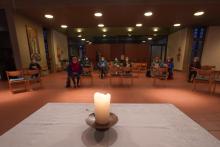
We pray for peace, O God of love and justice,
as once again, we face a time of war.
The meek and humble try—amid the crisis—
to love and build, to nurture and restore.
May leaders hear the truth the prophets teach us—
that gifts of peace are well worth struggling for
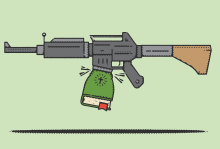
WAR-CULTURE IN THE United States is so pervasive and seamless that Americans struggle to see it, much less question it. More than $16 trillion has been spent since 2001 as “the calculus of 9/11 led to runaway growth in military spending,” according to the National Priorities Project. Forget Biden’s drawdown in Afghanistan and realistic proposals emphasizing diplomacy and economic cooperation. Secretary of Defense Lloyd J. Austin III declared in June that the $752.9 billion request in the FY 2022 military budget aligned with “the will of the American people.” What role do Christians play in this destructive reality?
Here is the problem: Religion and violence intertwine to fuel our ubiquitous war-culture. And in making war “sacred,” the death-dealing consequences are concealed from our consciousness.
Consider a common vehicle decal. A U.S. soldier stands silhouetted before an American flag shaped as angelic wings. The text reads: “Greater love has no one than this, that someone lay down his life for his friends” (John 15:13, ESV). Another popular meme says, “Remember that only two forces ever agreed to die for you—Jesus Christ and the American soldier.”
The decal verse is ripped out of context. Jesus’ soliloquy is on servant leadership, characterized by the loving washing of one another’s feet—not killing. Religious frameworks are hijacked to place a “sacred canopy” of meaning over the use of deadly force. For Christians, cognitive dissonance should abound. However, using the Bible to bless war is so common we hardly question it.
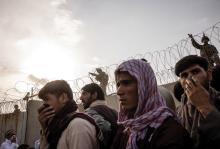
“I GRADUATED FROM university in 1968. I was drafted immediately. I had not really thought much about the war, but the more I talked to the guys who were coming back from Vietnam, the more I realized that this thing was terribly wrong. I began to think of the Vietnamese forces as liberation forces trying to free their country from foreign invasion—we were the invaders.
I went through a crisis of conscience. I saw a news report about soldiers who were speaking out against the war. I thought to myself, I can do that. I began to organize among soldiers in the barracks. We submitted a petition signed by 1,300 active-duty service members that was published in The New York Times.
The basis of my commitment to activism is faith: the belief that our role in life is to serve others, to overcome suffering and injustice, especially war, which to me, is the greatest sin."
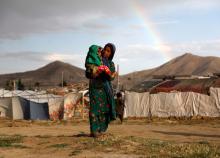
We weep for the places where war leads to war.
We pray for your hand there to heal and restore!
Bless all who seek justice and peace as your way.
We pray for Afghanistan’s people today.

The way presidents and governments use language reflects the society they want to construct — and for the United States, presidents have long attempted to build a narrative that hides he real impacts of war and makes the United States look the part of a noble hero. Crisis and pandemics don’t start wars, and they won’t end war, but the United States may use crisis to beat the drums of war.

COVID-19 ignores the social constructs we've made to disregard one another.

Tit-for-tat killings had started between Christians and Muslims in Jos. In Muslim-dominated areas, Muslims roamed the streets and singled out Christians. In Christian-dominated areas, the Christians retaliated with killings Muslims. Cars, houses, and churches were burned to the ground.
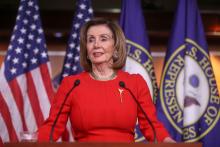
In the aftermath of Vietnam, Congress passed the War Powers Act in 1973, over the veto of President Nixon. It stipulates that the president should inform Congress 48 hours after initiating the military in any hostile action, and then limits the president for 60 days in carrying out such actions before Congress declares war or passes a proper authorizing action. It was an attempt to find a compromise between Congress’ power to declare war and a president’s need to take immediate military action in certain situations. Nearly ever president since, Republican and Democrat, has bristled under its provisions. Further, Congress has largely abdicated its responsibilities to enforce the War Powers Act provisions.
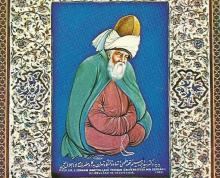
Today, the United States and Iran are two countries on the precipice of war with ruling elites who quote Rumi.

The words of Jesus must now be taken seriously, “Blessed are the peacemakers, for they shall be called the children of God.”

Daniel José Older’s novel is a powerful meditation on love and betrayal in times of revolution.
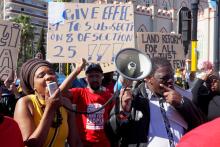
Lessons we can learn from peacebuilding in South Africa and Rwanda.

Francis of Assisi met Sultan Malik Al-Kamil 800 years ago.

In Narendra Modi’s India, an ominous new project is in progress. The recently instituted National Registry for Citizens (NRC) in Assam excludes almost 4 million from citizenship – effectively creating one of the largest groups of stateless people anywhere in the world. A majority of them are Muslims, and while those of other faiths can apply for reconsideration, Muslims cannot. Reports indicate plans to implement NRCs in other borderlands.

So when we seek direction, remind us what is true:
the Advocate is with us to help us follow you.
Christ, guided by the Spirit, may we your people be
A loving, faithful witness in this community.
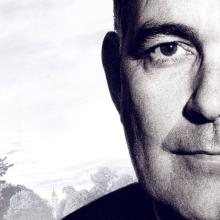
The new documentary Hesburgh, which premieres nationwide on Friday, May 3, and is directed by the Emmy-nominated filmmaker Patrick Creadon (Wordplay, I.O.U.S.A.) gives us a thorough look at Father Hesburgh’s walk. From Hesburgh’s origins to his decision to devote his life to the priesthood, to his appointment — at the young age of 35 — as president of the University of Notre Dame, to all the personal, national, and global adversities that the man of the cloth later faced afterward, Hesburgh weaves a beautiful and engaging story of faith lived out.
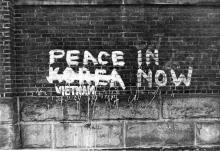
When new people come to our Mennonite church in North Carolina, whether from other traditions or from no church background, I imagine they are stirred by our views on peace and violence. The strangest part of our religious life is not that we believe that dead people come back to life, or that we try to live like a peasant we believe was God — it is our disposition toward military service.

Ten children, part of the same extended family, were killed by a U.S. air strike in Afghanistan, along with three adult civilians, the United Nations said on Monday. The air strike early on Saturday was part of a battle between the Taliban and combined Afghan and U.S. forces that lasted about 30 hours in Kunduz, a northern province where the Taliban insurgency is strong.

Could the United States ever do something so heinous that it would become morally necessary for a foreign military to drop bombs on my house? This is the question that was running through my mind on November 11, 2018, when Montclair Presbyterian Church in Oakland, Calif. —a congregation of around 250 souls who were kind enough to invite me to be their pastor five years ago — voted overwhelmingly to embrace pacifism by declaring itself to be a peace church.
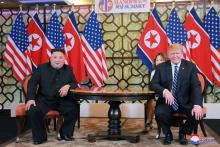
I worshipped at Seoul’s Myungsung Presbyterian Church, the largest Presbyterian church in the world with a membership close to 100,000, and preached at its English-speaking service. At the main Korean worship service I attended (one of five services that they offer each Sunday), I heard prayers for the reunification of Korea at least three or four times, which is a repeated intercession. Moreover, Myungsung is known for its daily prayer services. One of these gatherings that takes place every Monday is focused on praying for re-unification. It has been doing so for 10 years, normally drawing about 3,000 people.